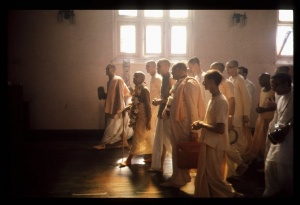SB 6.14.54: Difference between revisions
m (1 revision(s)) |
m (Text replacement - "==== <div class=" to "==== <div class=") |
||
| Line 1: | Line 1: | ||
{{info | {{info | ||
|speaker= | |speaker=Queen Kṛtadyuti | ||
|listener= | |listener=Queen Kṛtadyuti speaking to herself | ||
}} | }} | ||
[[Category:Srimad-Bhagavatam - Canto 06 Chapter 14]] | |||
[[Category:Bhagavatam Verses Spoken by Queen Krtadyuti - Vanisource|061454]] | |||
<div style="float:left">'''[[Srimad-Bhagavatam]] - [[SB 6|Sixth Canto]] - [[SB 6.14: King Citraketu's Lamentation|Chapter 14: King Citraketu's Lamentation]]'''</div> | |||
<div style="float:right">[[File:Go-previous.png|link=SB 6.14.53]] '''[[SB 6.14.53]] - [[SB 6.14.55]]''' [[File:Go-next.png|link=SB 6.14.55]]</div> | |||
{{RandomImage}} | |||
==== TEXT 54 ==== | ==== TEXT 54 ==== | ||
<div class="verse"> | |||
<div | :aho vidhātas tvam atīva bāliśo | ||
aho vidhātas tvam atīva bāliśo | :yas tv ātma-sṛṣṭy-apratirūpam īhase | ||
yas tv ātma-sṛṣṭy-apratirūpam īhase | :pare nu jīvaty aparasya yā mṛtir | ||
pare nu jīvaty aparasya yā mṛtir | :viparyayaś cet tvam asi dhruvaḥ paraḥ | ||
viparyayaś cet tvam asi dhruvaḥ paraḥ | |||
</div> | </div> | ||
| Line 17: | Line 22: | ||
==== SYNONYMS ==== | ==== SYNONYMS ==== | ||
<div class="synonyms"> | |||
<div | ''aho''—alas (in great lamentation); ''vidhātaḥ''—O Providence; ''tvam''—You; ''atīva''—very much; ''bāliśaḥ''—inexperienced; ''yaḥ''—who; ''tu''—indeed; ''ātma-sṛṣṭi''—of Your own creation; ''apratirūpam''—just the opposite; ''īhase''—You are performing and desiring; ''pare''—while the father or the elder; ''nu''—indeed; ''jīvati''—is living; ''aparasya''—of one who was born later; ''yā''—which; ''mṛtiḥ''—death; ''viparyayaḥ''—contradictory; ''cet''—if; ''tvam''—You; ''asi''—are; ''dhruvaḥ''—indeed; ''paraḥ''—an enemy. | ||
</div> | </div> | ||
| Line 25: | Line 29: | ||
==== TRANSLATION ==== | ==== TRANSLATION ==== | ||
<div class="translation"> | |||
<div | |||
Alas, O Providence, O Creator, You are certainly inexperienced in creation, for during the lifetime of a father You have caused the death of his son, thus acting in opposition to Your creative laws. If You are determined to contradict these laws, You are certainly the enemy of living entities and are never merciful. | Alas, O Providence, O Creator, You are certainly inexperienced in creation, for during the lifetime of a father You have caused the death of his son, thus acting in opposition to Your creative laws. If You are determined to contradict these laws, You are certainly the enemy of living entities and are never merciful. | ||
</div> | </div> | ||
| Line 33: | Line 36: | ||
==== PURPORT ==== | ==== PURPORT ==== | ||
<div class="purport"> | |||
<div | |||
This is the way a conditioned soul condemns the supreme creator when he meets reverses. Sometimes he accuses the Supreme Personality of Godhead of being crooked because some people are happy and some are not. Here the Queen blames supreme providence for her son's death. Following the creative laws, a father should die first and then his son. If the creative laws are changed according to the whims of providence, then providence certainly should not be considered merciful, but must be considered inimical to the created being. Actually it is not the creator, but the conditioned soul who is inexperienced. He does not know how the subtle laws of fruitive activity work, and without knowledge of these laws of nature, he ignorantly criticizes the Supreme Personality of Godhead. | This is the way a conditioned soul condemns the supreme creator when he meets reverses. Sometimes he accuses the Supreme Personality of Godhead of being crooked because some people are happy and some are not. Here the Queen blames supreme providence for her son's death. Following the creative laws, a father should die first and then his son. If the creative laws are changed according to the whims of providence, then providence certainly should not be considered merciful, but must be considered inimical to the created being. Actually it is not the creator, but the conditioned soul who is inexperienced. He does not know how the subtle laws of fruitive activity work, and without knowledge of these laws of nature, he ignorantly criticizes the Supreme Personality of Godhead. | ||
</div> | </div> | ||
__NOTOC__ | |||
<div style="float:right; clear:both;">[[File:Go-previous.png|link=SB 6.14.53]] '''[[SB 6.14.53]] - [[SB 6.14.55]]''' [[File:Go-next.png|link=SB 6.14.55]]</div> | |||
__NOTOC__ | |||
__NOEDITSECTION__ | |||
Revision as of 15:36, 14 November 2018

A.C. Bhaktivedanta Swami Prabhupada
TEXT 54
- aho vidhātas tvam atīva bāliśo
- yas tv ātma-sṛṣṭy-apratirūpam īhase
- pare nu jīvaty aparasya yā mṛtir
- viparyayaś cet tvam asi dhruvaḥ paraḥ
SYNONYMS
aho—alas (in great lamentation); vidhātaḥ—O Providence; tvam—You; atīva—very much; bāliśaḥ—inexperienced; yaḥ—who; tu—indeed; ātma-sṛṣṭi—of Your own creation; apratirūpam—just the opposite; īhase—You are performing and desiring; pare—while the father or the elder; nu—indeed; jīvati—is living; aparasya—of one who was born later; yā—which; mṛtiḥ—death; viparyayaḥ—contradictory; cet—if; tvam—You; asi—are; dhruvaḥ—indeed; paraḥ—an enemy.
TRANSLATION
Alas, O Providence, O Creator, You are certainly inexperienced in creation, for during the lifetime of a father You have caused the death of his son, thus acting in opposition to Your creative laws. If You are determined to contradict these laws, You are certainly the enemy of living entities and are never merciful.
PURPORT
This is the way a conditioned soul condemns the supreme creator when he meets reverses. Sometimes he accuses the Supreme Personality of Godhead of being crooked because some people are happy and some are not. Here the Queen blames supreme providence for her son's death. Following the creative laws, a father should die first and then his son. If the creative laws are changed according to the whims of providence, then providence certainly should not be considered merciful, but must be considered inimical to the created being. Actually it is not the creator, but the conditioned soul who is inexperienced. He does not know how the subtle laws of fruitive activity work, and without knowledge of these laws of nature, he ignorantly criticizes the Supreme Personality of Godhead.